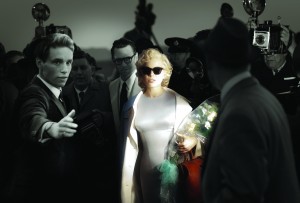‘My Week with Marilyn’ looks at the woman behind the smile

My Week with Marilyn feels like it should be more interesting, more engaging and more believable. As an exercise in impersonation, it achieves a certain respectability. As a definitive statement on the Hollywood of yesteryear and the unique stardom of the most iconic actress in history, the movie simply feels too amateurish.
The problem, surprisingly and unfortunately, rests with Michelle Williams. This more-than-able actress is an intelligent, nuanced performer. I like to think of her as the strongest quarter of the Dawson’s Creek quartet.
As Monroe, she does her best with the stilted material, but the performance never leaves the field of emulation. There’s never a second when one believes the real blonde bombshell has graced us with her presence. It all feels too theatrical, like one big, boring game of dress up.
It’s a pity because the premise of the story has real potential. Unlike this year’s J. Edgar, which bit off more than it could chew, My Week with Marilyn smartly focuses on a few days in the life of the starlet. This spotlight technique is the proper way to film a biography. The screenwriter Adrian Hodges, working off the book by Colin Clark, doesn’t have to work through the checklist of Monroe’s life. This lets the picture breathe a bit and also saves it from montage monstrosities.
Instead, we view Monroe from the eyes of Clark (Eddie Redmayne, a Tony winner for Red), a young, doe-eyed Brit with a dream of working behind the scenes in the cinematic world. After hanging out at Laurence Olivier’s production studio long enough, he is given the thankless job of serving as the third assistant director on The Prince and the Showgirl, a movie starring Monroe and Olivier.
By having this outsider’s perspective, we are able to watch everything from the edges of the set. We are truly audience members, because Clark, himself, is like an audience member. We are dazzled by the professionalism of Olivier and company, and disappointed in Monroe’s timidity. When the production screeches to a halt, after clashes between the two stars, we don’t travel with the two iconoclasts into their respective corners. Instead, we stay with Clark, always the skeptical watcher.
Of course, the detriment of this storytelling technique is that both Olivier and Monroe feel like strangers, and when we are invited to see their true selves, we still have the stigma of the outsider. So, even if the performances elevated beyond impersonations, we only catch these actors through glimpses.
As the shooting of the movie continues, and the delays continue to mount, Clark and Monroe eventually become unlikely supporters of each other. They are somewhat similar in age, and the actress can identify more with this third assistant director than with her famous husband, the playwright Arthur Miller (Dougray Scott).
When her hubbie skips town, the two love birds are able to frolic in the high grass and skinny dip in a nearby river. Oh, to be young in England, where the weather can change on a dime and swimming in cold water doesn’t lead to pneumonia.
This being Marilyn Monroe, it doesn’t take much to deduce that Clark is going to have his heart broken. But in their fleeting fling, he gets to know the “true” Marilyn. He sees her put on a display when the fans start crowding around. She shakes that behind, purses her lips and blows kisses to the boys. Inside, she’s depressed, lonely and misunderstood. Her solution is to pop pills, a practice promoted by her entourage.
If Williams stumbles a bit, it’s mostly because she tries too hard. The voice is never perfect, and the crying never seems to fit. The performance (and the movie) feel more appropriate for television drama than a silver-screen endeavor.
Kenneth Branagh, playing Olivier, fares much better. He is able to creep under the skin of the most famous British actor of our time. In the few scenes where he’s allowed to display his true emotion, the actor behind the actor shines. Unfortunately, the script almost seems to judge Olivier for his bad temperament and frustration over Monroe’s inept acting ability and constant tardies. The blonde bombshell was the first of the “problem celebrities,” and, at least as portrayed in this movie, would fit perfectly on Celebrity Rehab.
It’s a shame that My Week with Marilyn, directed ably enough by Simon Curtis, doesn’t elevate these icons above caricature status. There are real stories to be told about this actress and her unbelievable life.
But, after 99 minutes, the real Monroe is as elusive as ever.
By John Soltes / Publisher / John@HollywoodSoapbox.com
-
My Week with Marilyn
-
2011
-
Directed by Simon Curtis
-
Written by Adrian Hodges; based on the book by Colin Clark
-
Starring Eddie Redmayne, Michelle Williams, Kenneth Branagh, Judi Dench and Emma Watson
-
Running time: 99 minutes
-
Rated R for some language
-
Rating:





